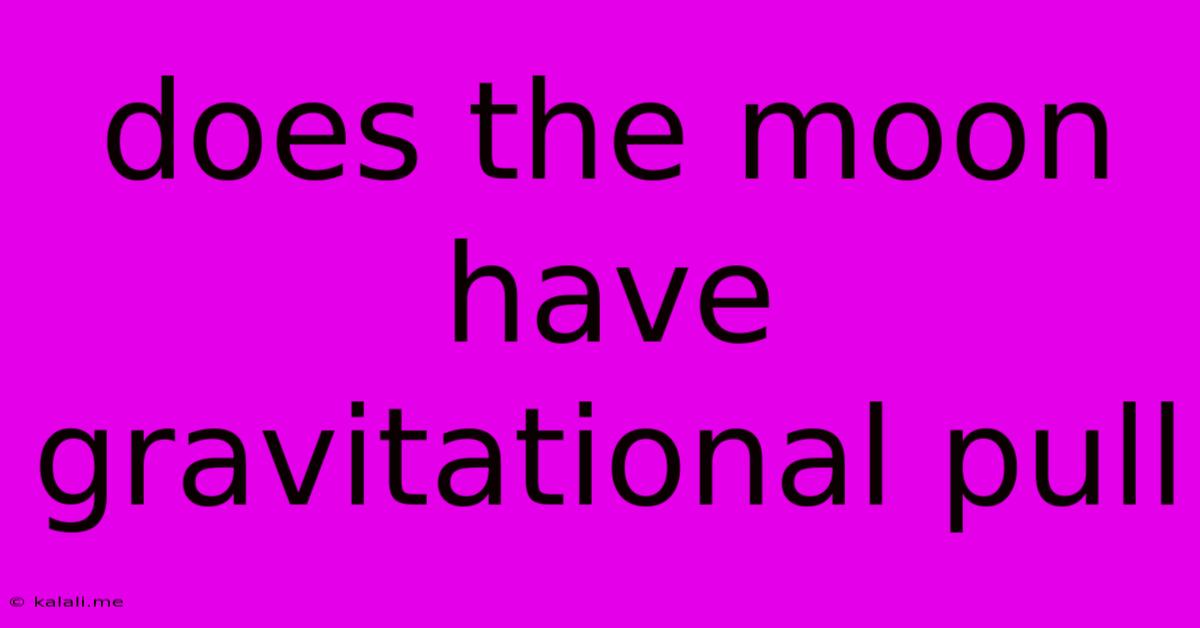Does The Moon Have Gravitational Pull
Kalali
Jun 07, 2025 · 3 min read

Table of Contents
Does the Moon Have Gravitational Pull? A Definitive Answer
Yes, the moon absolutely has a gravitational pull. In fact, it's the moon's gravity that's responsible for the ocean tides on Earth, and it plays a significant role in stabilizing our planet's axial tilt. Understanding the moon's gravity helps us appreciate its influence on our planet and even our understanding of the solar system. This article will delve into the specifics of lunar gravity, its effects, and how it compares to Earth's gravity.
The Force Behind the Tides: Understanding Lunar Gravity
While significantly weaker than Earth's gravity, the moon's gravitational pull is still a powerful force. It's this force that causes the bulge of water we know as high tide. The moon's gravity pulls on the Earth, but because water is fluid, it responds more dramatically. The side of the Earth closest to the moon experiences a stronger pull, creating a bulge of water. Simultaneously, a second bulge occurs on the opposite side of the Earth, a result of inertia. The areas between these bulges experience low tides. The sun also exerts a gravitational pull on Earth, contributing to the tidal forces, although the moon's influence is greater due to its proximity.
Comparing Lunar and Terrestrial Gravity
The gravitational pull of an object is directly proportional to its mass and inversely proportional to the square of the distance from its center. Because the moon is considerably smaller and less massive than the Earth, its gravitational pull is much weaker. Specifically, the moon's surface gravity is about 1/6th that of Earth's. This means an object weighing 100 pounds on Earth would weigh approximately 16.5 pounds on the moon. This difference is why astronauts can seemingly leap and bound across the lunar surface.
The Moon's Influence Beyond Tides:
The moon's gravitational pull extends beyond its effect on tides. Its influence helps stabilize Earth's axial tilt. Without the moon's gravitational influence, Earth's tilt would vary wildly over time, leading to dramatic climate changes. This stable tilt is crucial for maintaining relatively consistent seasons and a climate conducive to life.
Lunar Gravity and Space Exploration:
Understanding lunar gravity is vital for successful space exploration. Mission planners need to account for the moon's gravitational pull when designing trajectories for spacecraft orbiting the moon or landing on its surface. Precise calculations are necessary to ensure successful maneuvers and landings. Moreover, the lower gravity on the moon provides unique opportunities for scientific research, offering insights into planetary formation and the effects of low-gravity environments.
Mythbusting: The Moon's "Dark Side" and Gravity
It's important to clarify a common misconception: The moon doesn't have a "dark side" in the sense of a permanently shadowed side. Both sides of the moon experience periods of sunlight and darkness. However, one side of the moon always faces Earth due to tidal locking. This doesn't affect the moon's gravitational pull; gravity acts uniformly in all directions.
In Conclusion:
The moon's gravitational pull is a fundamental aspect of our solar system, influencing Earth's tides, stabilizing its axial tilt, and impacting space exploration. While weaker than Earth's gravity, its effects are profound and crucial for understanding our planet's environment and the dynamics of our celestial neighbor. The next time you look up at the moon, remember the powerful, albeit subtle, force it exerts upon our world.
Latest Posts
Latest Posts
-
Can You Plant Squash And Potatoes Together
Jun 08, 2025
-
How Do You Write Square Feet
Jun 08, 2025
-
Was Jesus Supposed To Not Be Judah
Jun 08, 2025
-
Where Does The Air Go In Space
Jun 08, 2025
-
Get Only 2 Years Data From Datalake Hive Tables
Jun 08, 2025
Related Post
Thank you for visiting our website which covers about Does The Moon Have Gravitational Pull . We hope the information provided has been useful to you. Feel free to contact us if you have any questions or need further assistance. See you next time and don't miss to bookmark.